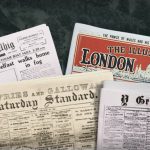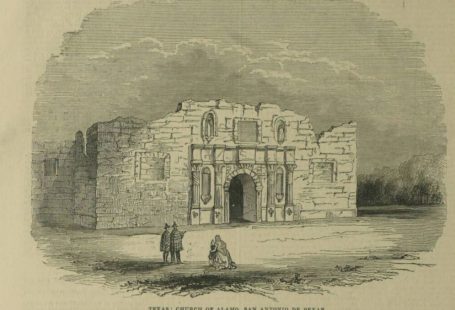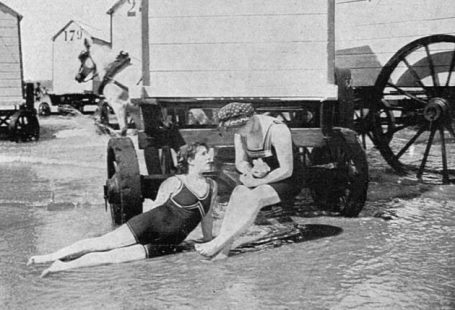This week at The Archive we have added 122,558 new pages, from Norfolk to Northern Ireland, from Hull to Hammersmith. We have updated 24 of our existing titles in total, incorporating updates to some of our specialist transport and temperance titles. Meanwhile our updates this week span over 160 years of headlines, our earliest update being the year 1836 to the Town and Country Advertiser, and our latest being the year 1999 to the Lynn Advertiser.
This week sees plenty of additions to our later twentieth century holdings on The Archive, and so we decided to take a look at some more recent history this week using these new pages. So read on to discover more about our updated titles of the week, as well as to find out more about the three-day week, which was introduced in January 1974 to conserve energy in response to a miners’ strike.
Register now and explore the Archive
But we begin by highlighting a slightly older title this week, which is temperance newspaper On The March. Published by the Royal Army Temperance Association (RATA), the group and its newspaper aimed for the:
…Promotion of Sobriety in the British Army at home and abroad, through the formation of Branches, whose object is to establish a strong regimental opinion in favour of strict sobriety, uprightness of character, and decency of language, in fear of God.

The pages of On The March were filled with reports on the activities of the association, as well as photographs of its members, and the competitions it held, like the RATA shooting competition. Meanwhile, it promoted abstinence from alcohol by providing ‘temperance testimonies,’ which were accounts from soldiers who had given up alcohol, as well as featuring articles detailing the ‘scientific reasons for total abstinence.’ Even its adverts adhered to the newspaper’s message, with ‘Montserrat Lime Juice Cordial’ given as a suggestion for ‘what to drink.’
The RATA and its newspaper, which appeared every month, were moreover endorsed by none other than the King himself, George V, with his words emblazoned on its front page:
It is my earnest desire that the ranks of this admirable organisation may be more reinforced and its good influence extended to every part of the kingdom.

We have updated another nobly principled newspaper this week, which is the Presbyterian title Witness (Belfast). We have added over 18,000 new pages to this title, which was first published on 3 January 1874 and circulated ‘in Ulster and Ireland generally.’ Costing just one penny, and filling eight pages, Witness (Belfast) set out to be a ‘useful family intelligencer,’ hoping to represent:
…a teacher as well as a newsmonger. We mean to communicate instruction as well as intelligence. We hope to profit as well as to please.

True to its religious roots, Witness (Belfast) featured such articles as ‘Biographical Sketches of the Irish Presbyterian Worthies’ and looks at ‘Scripture Difficulties,’ as well as containing news from churches of various denominations. It also contained ‘General News’ from across Ireland, England and the rest of the world, whilst featuring poetry, a ‘Corner for Little Ones’ and notices of births, marriages and deaths.
Meanwhile, we have added over 25,000 pages to the Lynn Advertiser this week, from the 1960s and the 1990s. Founded in 1842 by John Thew, the Lynn Advertiser was published in the Norfolk port and market town of King’s Lynn. It filled an important gap in the market, ‘for the want of such a medium of intelligence in the Western Division of this extensive county, had long been felt.’

The first attempt at a newspaper in the area was the Lynn and Wisbech Packet, which was established in 1760 but failed after just two years. The Lynn Advertiser would see more success, however, reaching a circulation of 800 copies by 1845. Covering news from Norfolk and its adjacent counties, the Lynn Advertiser became known from 1868 as the Lynn Advertiser, Wisbech Constitutional Gazette and the Norfolk and Cambridgeshire Herald, becoming in 1944 the Lynn News & Advertiser, before becoming simply the Lynn News in 1989, and the newspaper continues to be published to this day.
We stay in Norfolk now to highlight the 15,000 pages we have added this week to the Diss Express, which was established in the south Norfolk market town of Diss in 1864 as the Diss Express and Norfolk & Suffolk Journal. ‘Serving North Suffolk and South Norfolk,’ the newspaper cost one penny and was founded by a Mr. E. Abbott.

Politically independent, the Diss Express appeared every Friday, and continues to do so to this day, circulating in a five hundred square mile area across the Norfolk and Suffolk area, its combined print and digital audience averaging 29,000 per week. We have added pages from the 1970s, 1980s and the 1990s to the Diss Express this week.
Meanwhile, we have also added pages from the 1970s, 1980s and 1990s to Hampshire publication the New Milton Advertiser. The New Milton Advertiser was first published in the market town of New Milton, which lies just south of the New Forest, in 1928. Serving the New Forest and Christchurch area ever since then, the newspaper also covers Barton-on-Sea and Lymington.

Other highlights from our updated titles this week are the over 7,000 pages we have added to both the Liverpool Journal of Commerce and the Deal, Walmer & Sandwich Mercury, whilst we have added the year 1879 to our wonderful specialist railway title, the Railway News.
The Three-Day Week
On 1 January 1974 the Conservative government introduced the three-day week, which was an attempt to conserve energy in the face of a miners’ strike. The three-day week limited commercial users of energy to just three days’ worth of electrical consumption; such businesses and factories were not allowed to work outside of their allocated three days, or longer on their given days.
There were some exceptions to the three-day week, however, with hospitals, supermarkets and newspaper printing presses deemed as essential, and therefore exempt from the rule. And with the addition of new pages from the 1970s to The Archive this week, we thought we would take a look at how communities coped with the three-day week, and how it impacted people across the country.

On 5 January 1974, a matter of days after the legislation was passed, Hampshire title the New Milton Advertiser reported how:
In common with other industry in the area, Wellworthy factories are operating a three-day week, their allocation for electricity supplies being on Thursdays, Fridays and Sundays.
Workers at Wellworthy, a company which manufactured pistons and piston cylinders, would be working ten hour day, with breaks ‘for lunch and tea.’
But some workers were not so lucky, however, with the three-day week putting many out of work. At the end of January 1974, the Diss Express published a piece entitled ‘3 Day Week Hits Diss,’ which detailed how there were currently 1,201 ‘unemployed people’ in the area. However, ‘in addition to this,’ there were ‘a further 1,005 persons ‘temporally stooped’ as a result of a three-day week.’

So in the area of Lowestoft, Beccles, Bungay, Diss, Halesworth and Southwold over 2,000 people were unemployed, with just under half of these not being able to work as a consequence of the three-day week. Meanwhile, the town of Diss was reportedly the worst hit by the three-day week, having ‘the highest number of people’ who were temporarily stopped.
An interesting by-product of the three-day week was noted some weeks later by the Diss Express, on 15 February 1974. The local council was discussing limiting licences for fruit machines in cafes to just the one, council member Mr. L.P.R. Brown claiming ‘that people on a three-day week were wasting money on such machines.’
He told the meeting:
People on a three-day week are spending as much as £10 a day on machines in cafes. I don’t mind anyone making profits, but if we have a chance to make more money for the Council, we should issue licences for only one machine at a time, so if they want more, they pay more.

Meanwhile, a Conservative MP candidate for Christchurch and Lymington, Mr. Adley, who was then serving as an MP for Bristol North East, described ‘another fascinating by-product of the 3-day week,’ which was detailed in the New Milton Advertiser on 26 January 1974. Mr. Adley said that the three-day week had seen:
… a significant increase in productivity. According to the C.B.I. the three-day week has been accompanied by the maintenance of 80% production in much of British industry. This seems to indicate a staggering 30% increase in productivity when people are faced with job uncertainty: combined with the emergence of the spirit of survival when having to cope with the real possibility of falling wages caused by falling production.
Some changes were later made to the three-day week regulations, the New Milton Advertiser reporting how they had been ‘laid before Parliament on Wednesday, January 30th.’ The changes were:
1) Bring the restriction in the use of electricity by firms which have normally worked seven days a week into line with those firms which have normally worked only five days.
2) Permit firms with their own transport to carry out essential maintenance and repair of their vehicles on their own premises outside the three permitted days.
3) Confine the exemption from the three day restrictions to newspapers in the generally accepted sense of the term and not, for example, to magazines and periodicals.

The first change meant that companies who had previously worked seven days a week were now able to work ‘the same number of hours as they used to do on a Sunday, excluding the mid-day peak between noon and 2.30pm.’ This was in addition to their allocated three days.
The three-day week came to an end on 7 March 1974, following the General Election which was held on 28 February and resulted in the Conservatives losing their majority. Labour came to power in a minority government with Harold Wilson at the helm, but the three-day week of 1974 would always be remembered as a time of great uncertainty and instability, as chronicled in our newspapers.
UPDATED TITLES
This week we have updated 24 of our existing titles.
You can learn more about each of the titles we add to every week by clicking on their names. On each paper’s title page, you can read a FREE sample issue, learn more about our current holdings, and our plans for digitisation.
Title |
Years Added |
| Bury Free Press | 1990 |
| County Tipperary Independent and Tipperary Free Press | 1897-1905, 1907 |
| Deal, Walmer & Sandwich Mercury | 1865-1869, 1880-1888, 1900, 1902, 1908, 1914-1920 |
| Diss Express | 1971, 1973-1975, 1980-1985, 1994 |
| Hammersmith Advertiser | 1861 |
| Haverhill Echo | 1976-1977, 1990 |
| Hull Daily News | 1875 |
| Irish Emerald | 1877-1880 |
| Kentish Independent | 1919-1922 |
| Langport & Somerton Herald | 1856 |
| Leek Times | 1891 |
| Liverpool Daily Post | 1919-1920 |
| Liverpool Journal of Commerce | 1886-1887, 1889 |
| Lynn Advertiser | 1963, 1967, 1995-1996, 1999 |
| Macclesfield Courier and Herald, Congleton Gazette, Stockport Express, and Cheshire General Advertiser. | 1837-1843, 1861 |
| New Milton Advertiser | 1970-1977, 1986, 1998 |
| On the March | 1914-1919, 1921 |
| Railway News | 1879 |
| Spalding Guardian | 1990 |
| Suffolk and Essex Free Press | 1990 |
| Surrey & Middlesex Standard | 1840 |
| Town and Country Advertiser | 1836 |
| Witness (Belfast) | 1880, 1894-1897, 1899-1900, 1902-1929, 1931-1937, 1939-1941 |
| Wolverton Express | 1960-1962 |
You can keep up to date with all the latest additions by visiting the recently added page. You can even look ahead to see what we’re going to add tomorrow.






